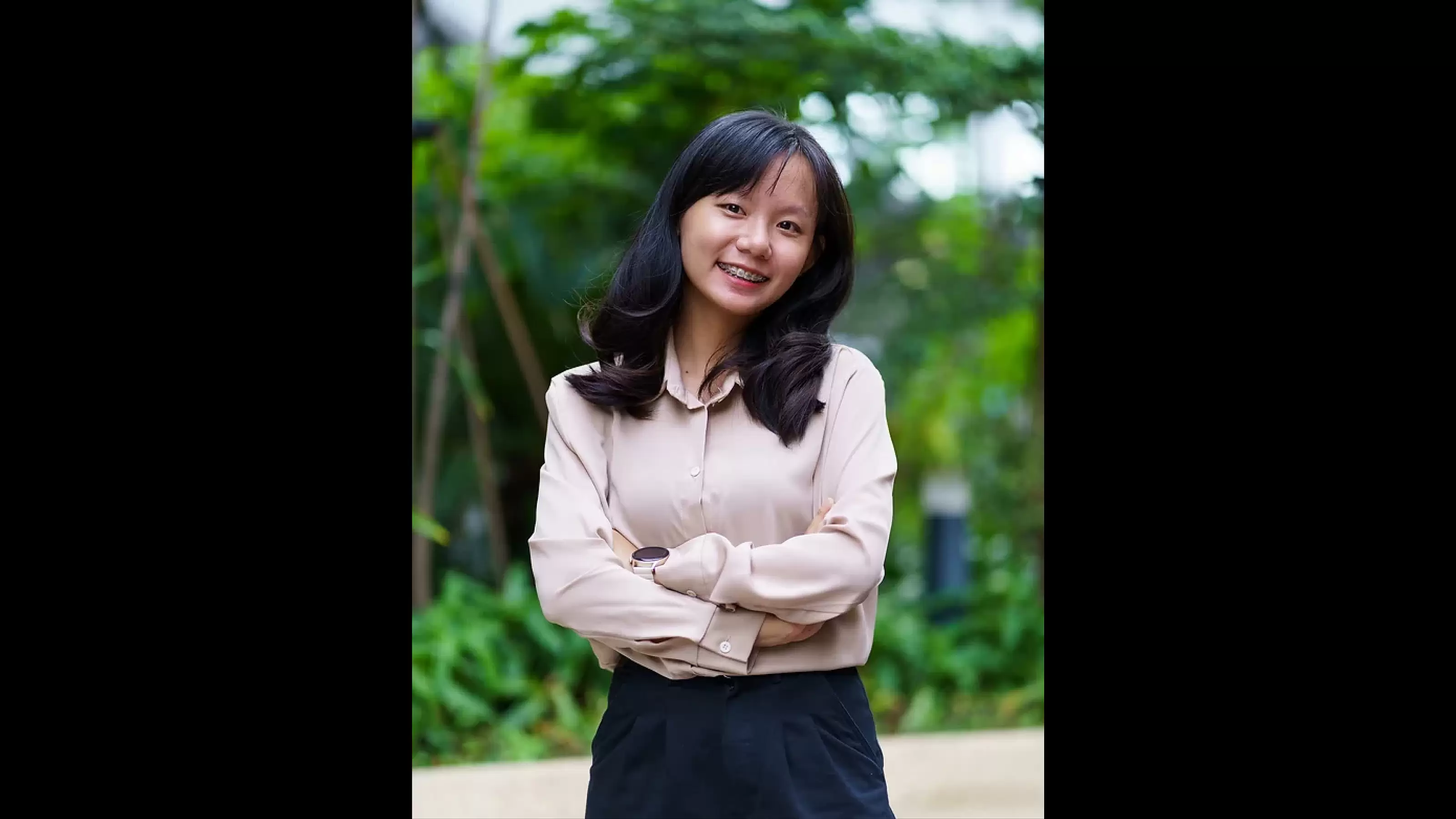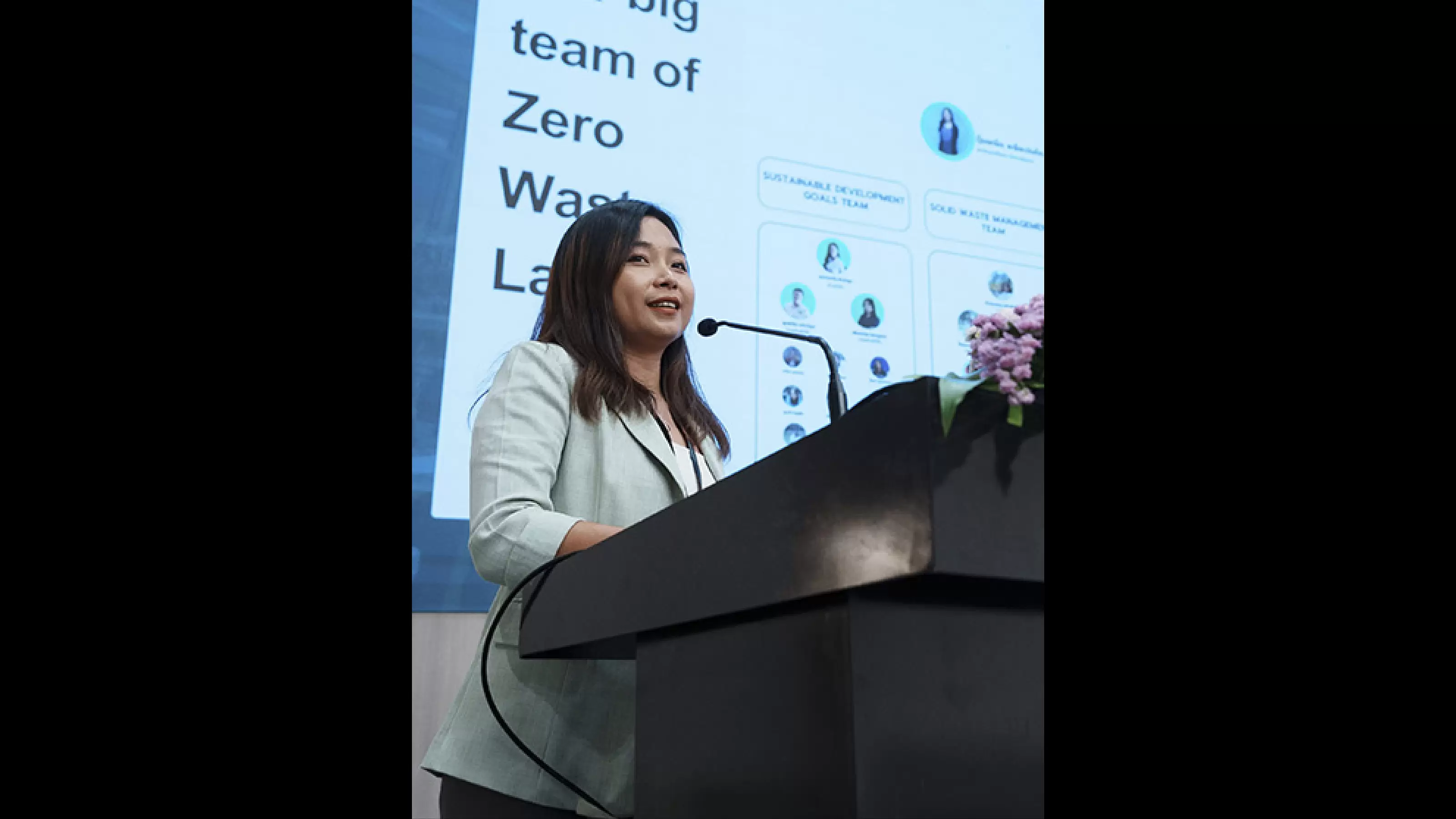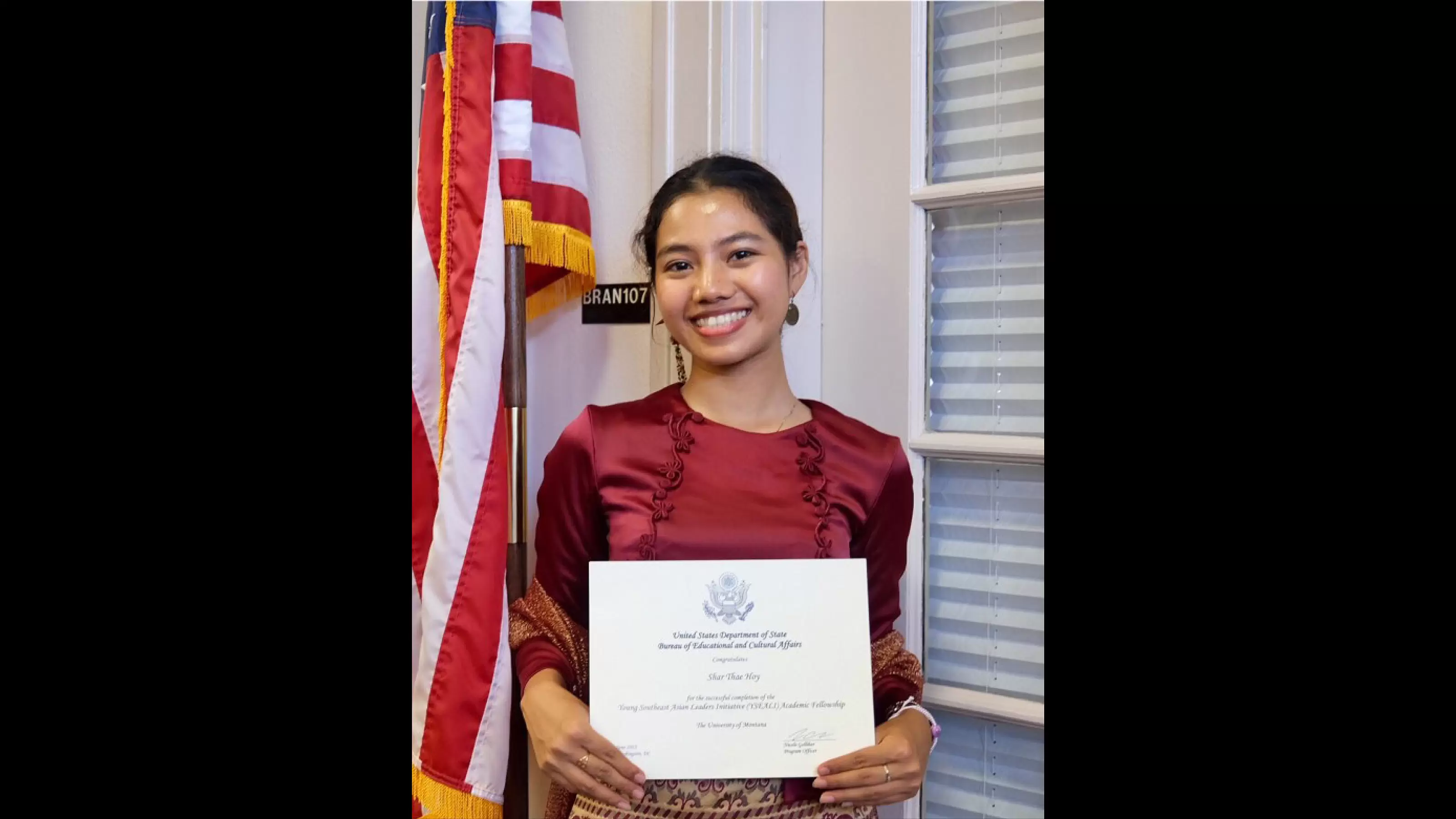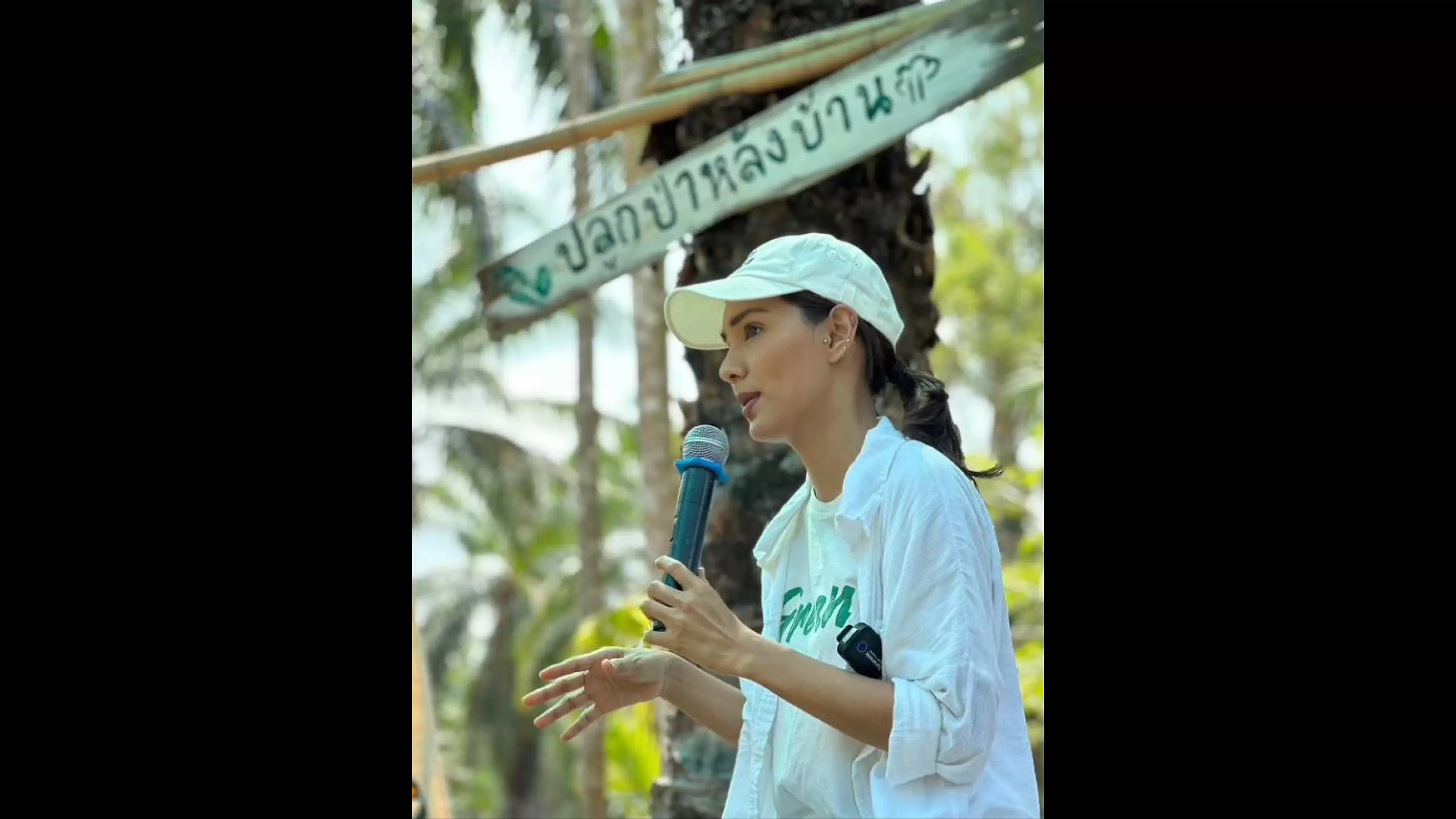Ready to get inspired?
Across the Greater Mekong Sub-region, young leaders are driving bold environmental change. From rural villages to bustling cities, they’re not just participants—they’re leading the charge for sustainability. In Laos, youth tackle plastic pollution with large-scale recycling and tree-planting campaigns. Cambodia’s dynamic advocates blend biodiversity education with viral social media, inspiring action. Myanmar’s young leaders raise awareness and take direct action against climate change, while Thailand’s visionaries turn urban spaces into thriving gardens, cutting carbon footprints and promoting local food. These changemakers are crafting solutions, educating peers, and reshaping their communities. Meet four inspiring leaders who show that when youth lead, real change happens.
Meet amazing environmental advocates from your region

CAMBODIA: Puthealy Vin
Puthealy Vin, project coordinator at YoungEco, is inspiring Cambodia’s youth through her dedication to environmental education. Since 2019, she’s led impactful initiatives like the Wonders of the Mekong campaign with USAID and biodiversity outreach in Siem Pang Wildlife Sanctuary. Her work emphasizes the importance of protecting Cambodia’s rich biodiversity and empowering young people to take action. Check out Puthealy’s keynote presentation at the Asia Pacific Forum on Sustainable Development, Youth Keynote Session 2023.

LAOS: Souksaveuy Keotiamchanh
Souksaveuy Keotiamchanh, founder of Zero Waste Laos, is a trailblazer in youth-led environmental advocacy. Winner of the 2022 Women of the Future Award for Southeast Asia, she leads a team of 80 changemakers, engaging over 10,000 young people in Laos through waste management, climate action, and gender equality initiatives. Under the Youth Climate Action Program, Souksaveuy spearheaded the planting of 28,000 trees across 550 schools in 11 provinces, forging partnerships with government, NGOs, and the private sector. Hear Souksaveuy’s inspiring story at the Women of the Future Southeast Asia Award 2023.

MYANMAR: Shar Thae Hoy
Shar Thae Hoy, leader of Climate Action Lab Myanmar (CALM), is empowering marginalized communities and young leaders with innovative climate action projects. She’s delivered over 20 public talks, pioneered green-stem schools, and enhanced access to climate tech and education for children in vulnerable areas. A 2023 Falling Walls Lab Myanmar Winner and 2024 Advisory Board Member, Shar continues to inspire resilience and innovation in tackling environmental challenges. Watch Shar’s talk at the Falling Walls Science Summit in Berlin 2023.

THAILAND: Jareerath Petsom (Baitong)
Baitong, crowned Miss Earth Thailand 2021 and Miss Earth Fire 2021, is a passionate environmental advocate from southern Thailand. As an Environmental Ambassador for the Green World Foundation and a UN Sustainable Ocean Ambassador, she champions conservation through media, advocacy, and her Instagram page Baan Baan, promoting eco-friendly living. With a focus on protecting forests and marine environments, Baitong inspires others to take small, intentional actions, proving that collective efforts can spark lasting change.

Download the full Eco Leaders Guide
Meet the Youth who shaped the Eco Leaders Guide
Sokleap “Leap” Lean, 23, Cambodia
Leap, born in Siem Reap and now living in Phnom Penh, has been a passionate advocate for the environment since 2022. At 23, his journey into environmental advocacy began when he was selected as a member of The U.S. Ambassador’s Youth Council in Cambodia. This role marked the start of his work with the Green Force project, where he helped young people connect with nature and understand the pressing environmental issues facing their communities. Leap’s involvement in the development of the Eco Leaders Guide began in January 2024, when he was chosen as one of the Cambodian representatives by the WWF team. His motivation to join the project was deeply personal. In 2023, while working with an NGO focused on improving clean water, sanitation, and hygiene in rural Cambodia, Leap observed the growing threats to the country’s vital water bodies, particularly Tonle Sap Lake and the Mekong River. I always wished to be part of any initiative to address these issues, and when I saw the recruitment for the Youth Reference Group, I knew this was my chance to contribute, he explained. Leap firmly believes in the importance of equipping youth in Asia with the knowledge and tools to be effective environmental advocates.
Ei Kabyar Moe “JuJue”, 23, Myanmar
JuJue was born in Hpasaung Township, a remote place in Myanmar’s mountainous Kayah State. "I remember how we used to rely on the river (which is known as the Thanlwin or Thanlyin River) near our place for everything – drinking, cooking, even bathing. But I had no idea about the importance and the value of it," she said. Although she took part in a range of environmental activities like litter pick-ups and tree planting, it wasn’t until she began studying Forestry and Environmental Science that she became deeply aware of the broader systems behind climate change, environmental conservation and many threats facing rivers and their ecosystems. As a volunteer facilitator at an English Conversation Club, she shared her knowledge of environmental issues such as water pollution and noise pollution, expanding her environmental advocacy work. JuJue is dedicated to environmental advocacy, finding renewed confidence through her work on the toolkit. Her favourite part of the toolkit is the section on developing an advocacy position, which she believes is essential for starting any advocacy journey. “Having a chance to understand how to turn passion into purpose and get connected with youth from other countries in the Mekong Region was an amazing experience for me,” she said. "When you see an opportunity, grab it and share it with others," she urges. "Even small steps can lead to significant change."
Souphavanh “Tooly”, Laos
Laotian Tooly has a deep connection to the Mekong River and has dedicated herself to raising awareness among youth about critical environmental issues facing the region. Through her work in leading workshops and collaborating with youth advocates, Tooly recognized significant gaps in understanding complex environmental issues. This motivated her to contribute to the development of the toolkit, which she believes is a vital step in bridging these gaps. Throughout the development of the toolkit, Tooly put it to the test in several workshops and says that it was helpful in facilitating deeper discussions and helping participants organize their ideas more effectively. Her experience with the Sustainable Mekong Research Young Professionals Project has given her insight into the importance of accessible and practical tools in environmental advocacy. Tooly’s favorite part of the process? Testing the toolkit with local youths, whose feedback led to meaningful improvements. Her advice to others? Believe in yourself and use your platform to advocate for the changes you wish to see. Even small steps can make a difference.
Aung Myat Thu, “Owen”, 24, Myanmar
Aung lives in the city he grew up in: Yangon. “It’s a place rich in culture and vibrant community life,” he says. Currently studying Civil Engineering at Thammasat University, he’s also a U.S. exchange alumnus of the Myanmar Youth Leadership Program at Indiana University. Aung’s passion for the environment was sparked during childhood when the devastating Cyclone Nargis struck Myanmar in 2008. “Witnessing the widespread environmental damage and loss it caused left an indelible mark on me.” Aung’s involvement in the Environmental Education toolkit began with his research during the COVID-19 pandemic, which focused on flood risk and freshwater resources in a township along the Yangon River. “This research broadened my understanding of the environmental vulnerabilities faced by communities and I witnessed an urgent need for assistance,” he said, adding that the courses he is studying now, along with projects like the toolkit, are equipping him with the knowledge and tools he needs to make a meaningful impact. Aung already has experience teaching environmental education to young people in Myanmar’s Ayeyarwady region, and though he gleaned much from the experience, he says, “the toolkit would have been incredibly helpful by providing structured guidance on how to effectively approach environmental issues. It would’ve offered me a clearer framework with practical activities for engaging with communities and more resources for educating them.”
Konelasy “Kone”, 20, Laos
Kone, originally from northeastern Laos, is already deeply involved in environmental education. Alongside pursuing his Bachelor's degree in Environmental Management at National University of Laos, he is a dedicated volunteer with the Social Environmental Education and Development (SEED), where he speaks at public events and leads campaigns to promote natural resource conservation and sustainable practices. His passion for the environment stems from witnessing firsthand the effects of deforestation and unregulated development in the Mekong region, which have led to increased flooding and other environmental issues, inspiring him to actively contribute to resolving and mitigating these issues. Kone joined the toolkit project to connect with other youth leaders and make a meaningful impact. He believes that empowering young people with the right knowledge and tools is crucial not only for the region but for the world. His message to the youth of the Mekong region? We have the power to drive significant change. Use the toolkit to take informed actions, collaborate with others, and inspire positive change.
Bouasone “Boua” Keosinouan, 22, Laos
Boua, who grew up near a branch of the Mekong River, has always felt a strong connection to the environment. This connection, combined with her passion for environmental advocacy, led her to become deeply involved in the toolkit project. Having previously worked with Syllabus Laos, Boua had a foundation in environmental education and youth advocacy. She believes that youth play a critical role in safeguarding the environment, especially in Laos, where more than half the population is under 45. She says that working on the toolkit was an eye-opening experience, and she appreciated the collaborative process with experts and youth from across the Mekong region. Boua’s involvement in the toolkit project has solidified her commitment to environmental advocacy, and she envisions a future where Laos has better waste management and a population more aware of climate change. Her message to other young people: If not you, who? If not your actions, what will happen in the future? Keep going with what you’re doing, and remember that every small action counts.
Rachatawun “Ooung-ing” Nirunsin, 20, Thailand
Ooung-ing, a sophomore majoring in economics with a minor in Spanish, is a budding environmental advocate. Her involvement in the Environmental Education Toolkit project was her first experience in advocacy, sparked by her participation in a sustainability camp for Asian students. Initially feeling out of place, Ooung-ing says she quickly recognised the value of her “beginner’s perspective” in making the toolkit accessible to those new to environmental issues. "It’s important to give basic knowledge to those who may not know much about the subject," she explained. Working with peers from across the Mekong region, she says she realised the shared nature of the challenges faced by the region. Growing up in Chiang Mai, where air pollution is a severe issue, Ooung-ing is particularly focused on air quality and renewable energy. Her personal experiences have deepened her commitment to sustainability, prompting her to make small but meaningful changes in her daily life, like reducing plastic use. Looking ahead, Ooung-ing hopes to see sustainability integrated into Thailand’s education system and aims to contribute to global sustainability efforts, possibly through the United Nations. "This project has made me want to do more for the world," she said, acknowledging how it has influenced her career aspirations. Ooung-ing also highlighted the importance of extending environmental education to underprivileged communities. "We need to make sustainability cool and accessible to everyone," she said.
Phyo Thet Naing “Jerry”, 24, Myanmar
“Growing up, there were no concrete roads and many streams and rivers,” says Jerry, who grew up in a small village 30 km from Mandalay, Myanmar. “During the rainy season, it was incredibly challenging to travel due to the lack of proper infrastructure and regular flooding.” Jerry’s early experiences of rural life and frequent floods have shaped his commitment to environmental advocacy. After high school, he moved to Mandalay to pursue a degree in Physics at Mandalay University. Struggling with homesickness and adapting to city life, he found ways to grow his passion for the environment and make lifelong friends through volunteer initiatives like “Trash Hero.” Initially aspiring to become an engineer, Jerry’s passion shifted towards protecting and improving society. “I noticed that while there are numerous experts in fields like IT, medicine, and economics, there are relatively few dedicated to environmental stewardship, especially in Myanmar,” he says. Jerry feels that in Myanmar, environmental responsibility is often neglected. As he continues his studies in Chiang Mai, Thailand, he is determined to change this. “I am particularly interested in renewable energy. With some prior experience and current studies in energy and wastewater management, I recognise the critical importance of energy use in our daily lives and at national levels. Transitioning away from fossil fuels and natural gas is essential, and I'm keen on exploring and mitigating the challenges associated with renewable energy sources like solar and wind power.”
Pasat “Jeff” To-ying, 23, Thailand
Jeff grew up in suburban Bangkok, where his love for nature began with wildlife documentaries. The mysteries of the natural world captivated him, inspiring him to share his passion with friends and to study Biology at university. As he grew older, Jeff witnessed rapid urbanisation in Bangkok over the course of eight years. “I witnessed how this disconnected people, especially young people, from nature,” he said. Using his scientific knowledge and passion for storytelling, he sought to raise awareness and reconnect people to the natural world. “I believe everyone can play a role in conservation,” he said. Today, he leads a communications team at Global Youth Biodiversity Network for Thailand, encouraging young people to protect biodiversity using their unique skills, or “superpowers” as he likes to refer to them. Jeff’s involvement in the Environmental Education Toolkit project allowed him to contribute his expertise in making the resources accessible and engaging. His favourite part of the toolkit? "The chapter on implementing advocacy campaigns—it's full of strategies to make your cause successful." Jeff believes in focusing on key influencers to create change. His advice to other young leaders? "Celebrate every success, no matter how small, because change is challenging but achievable together."
Keep exploring

Discover WWF in Asia Pacific
Asia-Pacific is home to a rich diversity of people and nature. WWF’s mission is to conserve the wildlife, habitats and natural resources here so that it can continue to support the wildlife and millions of people who depend upon it. Learn more here.


Explore the resources library
From Youth-led Environmental Organisations in the Mekong to international agreements and frameworks, discover useful resources to support your efforts.
This toolkit was made possible by the generous support of the American people through the United States Agency for International Development (USAID). The contents are the responsibility of WWF and do not necessarily reflect the views of USAID or the United States Government.


© 2022 WWF - World Wide Fund For Nature© 1986 Panda Symbol WWF – World Wide Fund For Nature (formerly World Wildlife Fund)® “WWF” is a WWF Registered Trademark Creative Commons licence.















